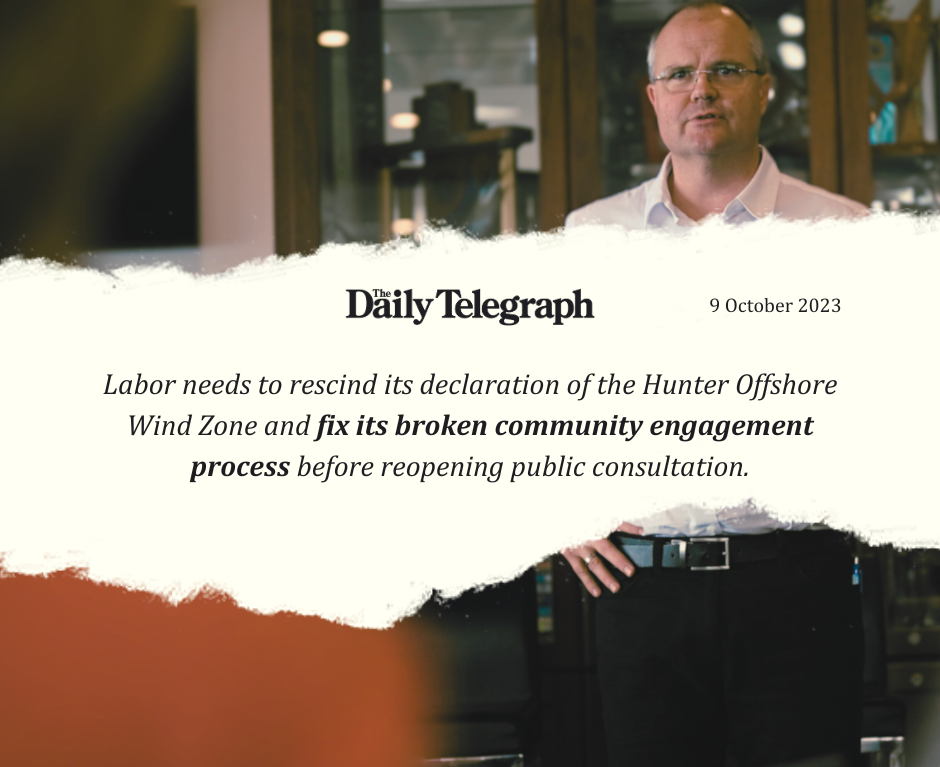Monday 9th October
As Published in The Daily Telegraph.
Labor needs to rescind its declaration of the Hunter Offshore Wind Zone and fix its broken community engagement process before reopening public consultation.
Impacted communities are angry and for good reason: they face the prospect of 260-meter-high wind turbines across their pristine coastline, following a flawed community engagement process.
Public consultation on the Hunter Offshore Wind Zone ran for 65 days between 23 February to 28 April in what many residents consider a sham process dressed up as a democratic exercise.
It was residents of Norah Head who first alerted me to the flaws in how the government was consulting on the proposed zone, and I accepted an invitation to visit the beachside community in early July.
There is no substitute for meeting people face-to-face on the ground.
I learnt that most locals didn’t even know that public consultations had already come and gone.
Locals told me about unions co-opting the community engagement process to encourage positive submissions.
I heard complaints about limited in-person briefings and how those who attended them left with more questions than answers.
Residents outlined deep concerns about the environment, worries for the migration pathway of humpback whales, the threat to local tourism businesses and risks to local commercial and recreational fishers.
I even heard about senior citizens unable to make written submissions as part of the process because only digital submissions were being accepted.
Then, suddenly, a breakthrough.
On the same day as my visit, Minister Chris Bowen announced a ‘Community Engagement Review’ to improve community engagement on renewable energy projects.
This was tantamount to an admission on the part of the Albanese Government that its consultation process was broken and needed to be fixed.
I welcomed the announcement.
Finally, the government was listening (or so it seemed).
But, much to my dismay, Minister Bowen proceeded to declare the Hunter offshore wind zone the following week.
The contradiction was stark. Labor knew its community engagement process was flawed yet they still used it as the basis for declaring an offshore wind zone, despite serious community angst.
The region has been taken for mugs, and they knew it.
Norah Head wasn’t the only upset community.
In meeting nearly 150 local residents at an open community town hall meeting in Port Stephens’ Shoal Bay a few weeks ago, their anger was palpable.
Tourism operators and professional fishers were furious; fearful that their businesses would soon be capsized by enormous projects offshore.
They had been steamrolled by the Albanese Government and the radio silence from their federal Labor MPs rubbed salt into the wound.
Their stories were similar to those at Norah Head: from residents not knowing about public consultations to unanswered questions and concerns about the local economy and environment.
One resident queried what the future holds for his children if the risks the community foresaw were to eventuate.
Despite these communities being in Labor seats, only the Coalition has demonstrated a willingness to hear and represent their interests.
I have thought long and hard about the conundrum Labor has created with the Hunter Offshore Wind Zone, and I’ve concluded that the zone is untenable in the absence of a social license.
The issue isn’t with offshore wind as a source of energy. Every technology has its pros and cons which is why an “All-of-the-Above” approach is needed so a balanced mix of technologies ultimately prevails.
Residents of these communities want climate change tackled and they see renewables as part of the solution, but that doesn’t mean they’re going to cop their way of life being jeopardized or their local economy and environment trashed.
The crux of the matter is that the government’s community engagement process in the Hunter was unambiguously flawed and the proposed offshore wind zone lacks community support.
Nevertheless, I believe there’s a pathway to building the needed social license, but it requires swift action on the part of the government.
Firstly, the Minister’s declaration of the zone should be rescinded.
Secondly, the community engagement process should be fixed through the review that has already been commissioned, so long as a revamped process puts the community, not investors, at the centre.
Thirdly, public consultation should be reopened under the new process.
I appreciate the Albanese Government is feeling desperate as renewable energy investment stalls and its 82% renewables target looks dicey, but that’s no excuse for showing reckless indifference towards regional communities.
Ted O’Brien
Shadow Minister for Climate Change and Energy
